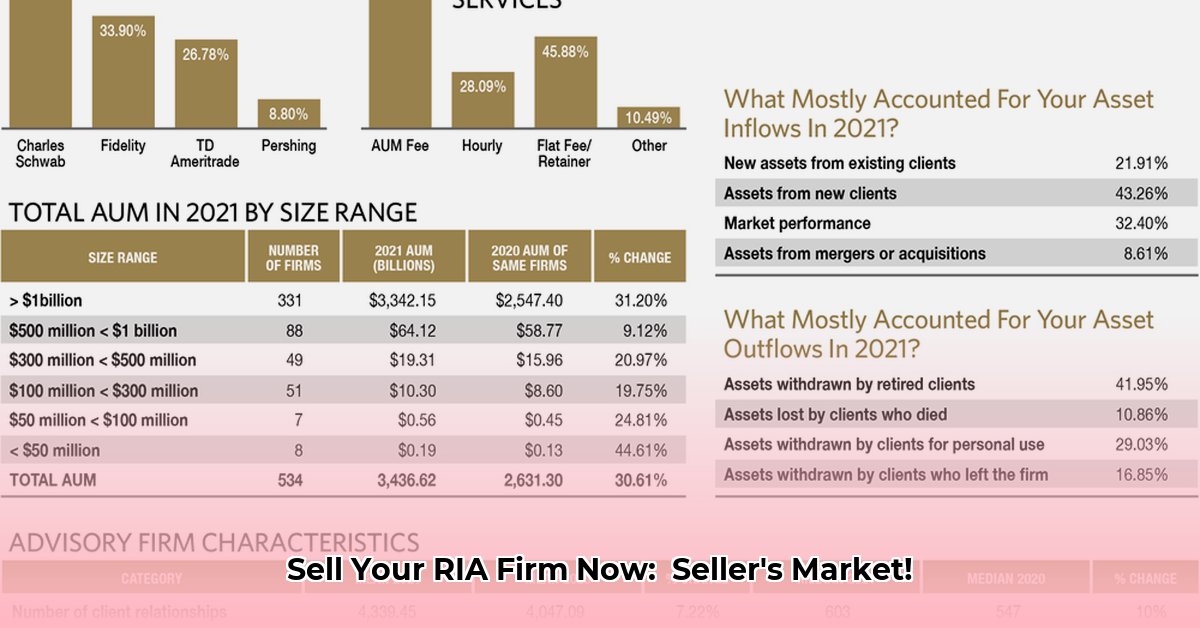
The Registered Investment Advisor (RIA) market is experiencing a seller's market, presenting significant opportunities for those looking to sell their firms. However, navigating this landscape requires strategic planning and execution. This guide provides actionable steps for both buyers and sellers to maximize their success.
Finding the Perfect Buyer for Your RIA Firm
Finding the right buyer is paramount. While online marketplaces offer exposure, a targeted approach yields superior results. Isn't it more effective to focus on quality over quantity?
1. Network Strategically: Engage actively within industry groups like the Financial Planning Association (FPA) and the National Association of Personal Financial Advisors (NAPFA). These connections provide access to buyers who appreciate your firm's unique culture and legacy.
2. Cultivate Strategic Partnerships: Seek out firms with complementary client bases and investment philosophies. This synergy minimizes post-acquisition disruptions and fosters client retention.
3. Leverage M&A Expertise: An experienced mergers and acquisitions (M&A) advisor brings invaluable expertise, uncovering potential buyers you might otherwise miss and securing the most favorable terms. Do you have the necessary experience to negotiate effectively in a competitive market?
Preparing Your RIA Firm for Sale
A successful sale begins long before the listing. Preparation is the cornerstone of a smooth and lucrative transaction.
1. Accurate Valuation: Obtain an independent valuation to establish a realistic price point. This provides the crucial data needed for confident negotiation and ensures you receive fair compensation for your efforts.
2. Comprehensive Documentation: Meticulously gather all financial records and operational documents. Complete transparency builds trust and accelerates the due diligence process.
3. Robust Succession Planning (If Applicable): For sellers planning retirement, a comprehensive succession plan ensures a smooth transition for clients and employees, preserving the firm's value and reputation. Isn't this crucial for safeguarding your legacy?
Maximizing Your Return: Negotiation Strategies
The seller's market provides significant leverage. Don't hesitate to negotiate aggressively to reflect your firm's true value.
1. Leverage Market Dynamics: The high demand empowers you to negotiate favorable terms. Don't undervalue your hard work and dedication.
2. Reciprocal Due Diligence: While buyers perform due diligence, you should thoroughly vet potential buyers, checking references and ensuring cultural alignment.
3. Secure Expert Legal Counsel: Experienced legal counsel protects your interests and safeguards against potential pitfalls during the complex legal procedures.
Mitigating Risks: A Proactive Approach
While highly advantageous, selling an RIA firm carries inherent risks. Proactive strategies mitigate these challenges.
| Risk Factor | Likelihood | Impact | Mitigation Strategy |
|---|---|---|---|
| Intense Buyer Competition | High | High | Targeted networking, highlighting unique firm strengths |
| Information Gaps | Medium | Medium | Open communication, thorough documentation |
| Valuation Disagreements | Medium | Medium | Independent valuation, robust market data support |
| Integration Challenges | Medium | High | Detailed transition plan, experienced integration specialists |
Cultural Alignment: A Critical Success Factor
Cultural compatibility is vital for successful RIA acquisitions. This is more than just a soft factor—a cultural clash can jeopardize even the most promising deals.
Key Takeaways:
- Thorough due diligence extends beyond financials to include a cultural compatibility assessment.
- Open communication and transparency are vital throughout the acquisition process.
- A defined integration plan addresses operational and cultural aspects for post-acquisition success.
- Understanding the regulatory environment for RIAs is crucial for compliance and avoiding legal pitfalls.
Preparing for a Smooth Transition: For Sellers
A successful sale centers on finding a buyer whose values align with yours, ensuring minimal disruption and continued success post-acquisition.
- Self-Assessment: Understand your firm's culture, its core values, and the team’s unique characteristics. This self-awareness guides your search for a compatible buyer.
- Target Buyer Selection: Prioritize buyers whose values align with yours rather than solely focusing on the highest bidder.
- Transparent Communication: Openly communicate your firm's culture and operational style throughout the negotiation process, thus building trust and avoiding post-acquisition surprises.
- Integration Planning: Collaborate with the buyer to develop a comprehensive integration plan, which proactively addresses potential cultural differences.
Due Diligence: Beyond the Balance Sheet: For Buyers
For buyers, due diligence extends beyond financial analysis to include a thorough assessment of the target firm's culture.
- Cultural Audit: Observe employee interactions and understand their values and goals through direct engagement.
- Client Surveys: Gauge client sentiment to ensure a smooth transition and prevent client attrition.
- Integration Strategy: Develop a detailed integration plan that addresses potential cultural mismatches.
- Open Communication: Maintain open communication with the existing team to foster engagement and reduce anxiety throughout the acquisition process.
Navigating the Regulatory Landscape
Both buyers and sellers require expert legal and compliance guidance to navigate the complex regulatory environment for RIAs. Professional advice is crucial to avoid legal issues and financial penalties. Ignoring this step is a significant risk.